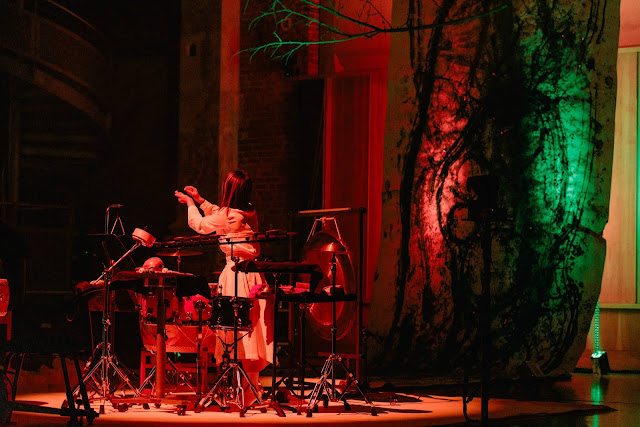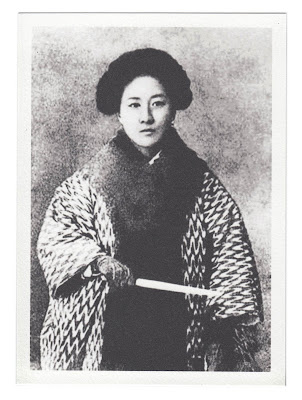 |
| Echo Nature – Tangram at LSO St Luke’s, January 2024 |
Bound/Unbound is a new music theatre piece created by London-based China-born composer Sun Keting and London-based British-Chinese composer Alex Ho. The two are joint directors of the music collective Tangram who are presenting the work at LSO St Luke’s on 9 & 10 August 2024 as part of Tangram’s position as Associate Artists at LSO St Luke’s and the performances feature soprano Haegee Lee, dancer Yining Chen and percussionist Beibei Wang with Tangram artists and musicians from the LSO. The piece interweaves the stories of two very different Chinese women, Afong Moy, the first Chinese woman to come to the USA in 1834, and Qiu Jin, the 20th-century revolutionary.
 |
| Alex Ho & Sun Keting (Image taken from video interview) |
Sun Keting and Alex Ho are joint directors of Tangram and this led them to want to co-compose. Alex has experience in opera and stage works whereas Rockey (Sun Keting) has worked with dancers, so they conceived of a piece that would combine their past experiences and see what happened. The two describe co-composing as a new experience for both of them, interesting in its own right.
The choreographer, Yining Chen, is a specialist in traditional Chinese dance and the work was intended to combine both dance and singing, though the two composers emphasised that it wasn’t a case of music, singing and dance, there are sections which involved pure dance and others just singing.
They worked with the librettist, British Chinese writer Xiaolu Guo to create the story which involves Afong Moy (born around 1815/1820), who was taken to the USA to be displayed alongside Chinese goods as ‘The Chinese Curiosity’, and Qiu Jin (1875-1907), a feminist revolutionary and master swords person who also wrote poetry, yet came to a tragic end as she was executed for trying to overthrow the Manchu government. Qiu Jin’s skill with the sword links to the choreography including a sword dance.
The two women never met, of course, their dates do not match up, and the two composers describe it as the encounter that never was, yet the work binds their experiences together. As Rockey and Alex see it, both women were oppressed by the patriarchy, but whereas Afong Moy was objectified and had no agency, Qiu Jin had agency, was well-spoken and travelled to Japan for her education. Thus the two contrast, effectively one is an object but the other is a subject.
With the libretto created, the two composers had a mutual ground on which to create the music. Thanks to the text, which included rough stage directions, the two could visualise what was happening and divide it into sections, allocating them between them, as well as working on the crossfading between sections.
 |
| Qiu Jin |
They feel that it helped that they were co-directing the work as well so that the pair were responsible also for the staging and visual elements. They see the piece as being the response of a group of collaborators working on both the sonic and visual elements, and they could write the music knowing the visual elements that were in place. They reached out to visual artists Chang Meng and Ke Peng to create visuals and installations for the piece, thus making the creation joined up and connected.
As they worked Alex and Rockey sent each other sketches each day, discussing mood, colour and instrumentation. When I ask whether the audience will be able to tell that there were two creators, their response is ‘no idea’, but they add that people who know their music will be able to tell the different composers. But they were each responsible for different sections, with different moods, so that differences make sense in the context of the story. They feel that their two musics complement each other, and they did not worry about whether they sounded similar or not.
The experience of creating Bound/Unbound has made them interested in collaborating again. As they point out, most of the time, composers work on their own and it can be a long and sometimes boring process. Here, they had a good team and felt connected, whilst their own collaboration worked well. The two composers have been close, both socially and musically, for six years, they know each other’s music. As individuals, they both tended towards dramatic stage works.
Both composers are of Chinese heritage, yet writing music involving Western European art forms. I was intrigued as to whether either was aware of anything specifically culturally Chinese in their music.
Reviewers have pinpointed cultural references in Alex Ho’s music that he wasn’t aware of, but he is reluctant to try and pinpoint Chinese elements in his music, and equally reluctant to pinpoint Western ideas either. In Bound/Unbound, he sees the Chinese elements as being extra-musical, the story, the dance and the choreography, with his music standing outside this.
Sun Keting feels that she cannot tell what are Chinese and Western elements. When she studied at the Shanghai Conservatory of Music in China, they had a course on Chinese pentatonic music and the influence of this kicks in on projects such as Bound/Unbound, but she does not feel that the influence is there all the time.
They describe Tangram as a collective of artists. When they started the group, it was more of an ensemble involving the same group of people, who commissioned new works. But as they tended towards a thematic, interdisciplinary approach the group has changed. In January at LSO St Luke’s, they presented Echo Nature, a work involving performance artists, an installation and live action. Tangram is co-directed by Alex Ho and Sun Keting and their approach is flexible, they decide who to collaborate with and on what, trying simply to make interesting work.
Alex Ho and Sun Keting’s Bound/Unbound is at LSO St Luke’s on 9 and 10 August 2024, further information from the LSO St Luke’s website.
Never miss out on future posts by following us
The blog is free, but I’d be delighted if you were to show your appreciation by buying me a coffee.
Elsewhere on this blog
- More than entertainment: Oliver Webber and the Monteverdi String Band’s The Madrigal Reimagined – record review
- Confidence, style and engagement: Rossini’s The Barber of Seville at West Green House Opera is a complete delight – opera review
- An eclectic mix: Brixton Chamber Orchestra at Clapham Park Cube – review
- Prom 10: Ryan Wigglesworth, Laura van der Heijden & BBC Scottish Symphony Orchestra in Britten, Cheryl Frances Hoad & Elgar – concert review
- She played and sang: Gillian Dooley’s new book is the fruit of 15 years research on Jane Austen’s music collection – interview
- A world away from the Bibilical oratorio: Stanford’s Whitman setting is the focus for this disc of two of large-scale choral works – record review
- A vividly realised recording: rediscovering music by Latvian-American composer Gundaris Pone – record review
- Returning to Northern Ireland Opera for his third role, British-Ukrainian baritone Yuriy Yurchuk on Tchaikovsky’s Eugene Onegin – interview
- Relentlessly entertaining: Handel’s Acis and Galatea at Opera Holland Park rather over-eggs things but features finely engaging soloists – opera review
- Contemporary contrasts: Wolf-Ferrari’s Il segreto di Susanna & Leoncavallo’s Pagliacci in a satisfying double bill at Opera Holland Park – opera review
- A sound world that is distinctive, appealing & engaging: Maria Faust’s Mass of Mary on Estonian Record Productions – record review
- Home









